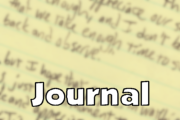Thinking about the credits music…
5 minute read
September 17, 2019, 9:14 AM
As you well know, I am a big fan of Today’s Special. I certainly know more about the show than most, and have traveled to Toronto to visit a number of different filming locations from the show. And before we get too far along, nerd alert: I’m going deep into the weeds with this one.
There’s one episode, though, where I take issue with the credits. In that instance, I think that the music that they chose to use doesn’t completely fit the mood of the ending. That episode is “Babies“, from 1984. In that episode, we learn that Wanda Willoby, from the Willoby Tale stories, has run away from her home in Possum Ridge and has come to the store, because she feels as though she is being replaced by a new baby that’s on the way. After everyone finds Wanda, they comfort her, and explain to her that her parents won’t love her any less now that there will be a third child in the family. Meanwhile, Wanda, while meaning well, causes a lot of trouble in the store, including accidentally dropping a large display of balls in the Children’s Department, and inadvertently backing into an alarm button in the Computer Room. This underlines the need to get Wanda back home to Possum Ridge as soon as possible. In the end, Wanda realizes that she is not being replaced by the new baby, and the episode ends with the storyteller, a young Lori Chodos (whom you might better remember as Beezus from the 1988 Ramona series), telling everyone how well Wanda handled the new baby after her experience in the store. The episode ends on a high note, though certainly differently than any other episode, since the storyteller had never been integrated into an episode like this before (storytellers typically appeared in standalone segments).
The end credits music used was the slow flute theme, which is the basic melody of the theme on flute with some other accompaniment. This is used on four episodes: “Babies” and “Butterflies” in 1984, and “Wishes” and “Phil’s Visit” in 1986. Of those four episodes, “Butterflies” and “Wishes” have sad endings. “Phil’s Visit” doesn’t have a sad ending per se, but it’s a very emotional episode about alcoholism, and the slow flute ending fits. Out of the four, only “Babies” has a happy ending. “Babies” is also the first episode to use that piece of music. For recurring pieces of music, the first usage is sometimes very different than the other usages. For instance, the music typically used during suspenseful scenes first appears in a relatively lighthearted scene in “Police“, where Sam is attempting to help Officer Hardy look for clues, but ultimately gets in his way. In almost every other instance, the tune is used to help build suspense, such as when a spaceship lands on the roof, or Muffy is rescued after becoming trapped in a utility chase.
Here is the ending for “Babies” as aired:
In the case of “Babies”, I think that they should have used the regular end credits theme, which is an instrumental of the main theme, instead of the slow flute theme. This is the default ending theme for most episodes, and is used when the final song of the episode does not run through the credits, or if the mood calls for a different closing song. Happy endings typically would get the regular end credits. “Babies” had a happy ending, which goes along with what the regular ending theme is typically used for. It wasn’t a downer ending by any means, though I suppose that one could argue that it fits the quieter ending with the story. However, I would argue that the regular ending just fits better.
Here is the ending of “Babies”, modified to use the regular ending theme:
You know, it just seems to fit. A happy ending deserves the regular credits music. The slow flute music seems to move at a slower, more thoughtful pace, which fits the heavier-hitting episodes that it was more often used with. The slower pace gives you a chance to think about and digest what you just saw while the credits run. This isn’t that, and I feel like the slower pace kind of drags out the credits. After all, in “Babies”, the story is wrapped up neatly, and everyone is happy: everyone at the store is happy that Wanda is back on Possum Ridge, and Wanda is proud of her new baby brother. That seems more suitable for the regular theme, since there’s nothing that the viewer needs to digest and process on their own. The regular ending signals that the episode is over, and that everything is well. “Babies” also wouldn’t have been the first episode to start the end theme well before the first card, either, nor would it be the last. Prior to that, “Adventure” started the end theme while Waldo was trying to correct a mistake from earlier, where he had accidentally given Muffy a mustache like Sam’s while casting a spell. While the end theme played, Waldo magically moved the mustache to Jeff and Jodie, and then finally to himself, where he then tried unsuccessfully to get rid of it while the credits were running on screen.
I have also given some thought to the ending of “Memories“. That episode, the last in the series, uses its own ending theme, based on the final song in the episode.
Here is the ending for “Memories” as aired:
Being the final episode, I always wondered what it might sound like with the regular ending, i.e. sending the show out with the traditional ending instead of a custom ending. So I swapped it in to see how it fit.
This is the end of “Memories” with the regular ending theme:
I was kind of surprised to discover that it doesn’t work very well. I knew that it was shorter than most credits sequences, as this one is 35 seconds, rather than the 45 seconds to a minute that most credits sequences run, though it’s not the shortest (“Water” with its 20-second credits sequence most likely holds that title). Putting the regular music on the “Memories” ending results in its starting at an odd place, in order for the song to finish at the right spot. The regular theme also feels too upbeat for the song that would have immediately preceded it in “Memories”, which is slower, and more thoughtful. I think that the only way that the regular ending theme might work, would be if it started at the first piano slide. However, that would either require a 53-second credits sequence, or a fade out before the song is complete. Fading the song out wouldn’t be the worst thing in the world, though. That happens in “Sleep“, which starts the theme much earlier than is typical, and fades out when the credits have ended. But considering that it’s the last episode, a fade out would leave me feeling like it was incomplete.
However, working on the idea that the ending for “Memories” as aired is slower and more thoughtful, I also considered how the slow flute theme would fit. The idea was that with the slower and more thoughtful ending, the slow flute ending might just work.
This is the end of “Memories” with the slow flute ending theme:
I was surprised that this ending worked so well. Prior to editing it in, my guess was that it wouldn’t work because of the shorter length of the “Memories” credits sequence. The slow flute ending runs for 45 seconds, and I was sure that cutting out the first ten seconds would destroy its balance. That turned out not to be the case, and as long as you fade it in, it flows quite well, and ends at the right spot. For “Memories”, it works, for the same reason that it works in “Butterflies”, “Wishes”, and “Phil’s Visit”: because it allows the viewer time to think about and process what just ran on screen. “Memories” isn’t a downer ending by any means, but that final song, which gives a rundown of the entire series, requires some time to mentally process things afterward, and the slower music provides some space for that processing to happen.
All in all, these little thought exercises, coupled with testing my theories with some video editing, are fun. Considering how deep in the weeds I’ve been getting with Today’s Special lately with “Project TXL” and all, as well as my recent trip to Toronto, it gets me thinking about things sometimes.
Categories: Today's Special









